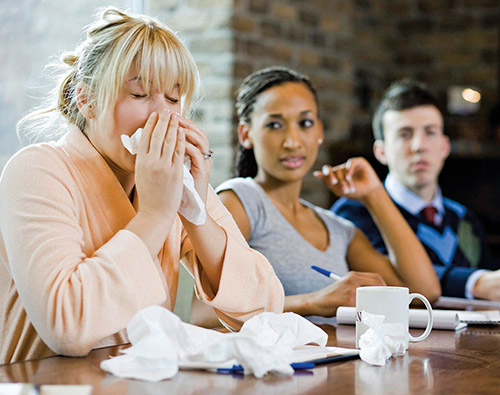
When the common cold hits, sharing is not caring.
(BPT) Being considerate of others when you’re sick is one of the first steps to good sick etiquette.
For example, you may think you’re going to score points for showing up at work despite feeling under the weather. However, if you were to run this by an etiquette expert like Diane Gottsman, she would probably tell you the reverse is true.
“A recent survey found that half of Americans feel anxious about getting sick when others cough around them,” Gottsman says. “So when you cough, your co-workers are likely going to be thinking of themselves and may not sympathize with you.”
That’s why Gottsman says the best thing you can do is steer clear of the office. If working remotely isn’t an option, it is best to take a sick day.
“When you’re sick, it’s so important to take precautions to keep your germs from infecting others, which should always include staying home from work or other activities until symptoms have subsided,” says Gottsman. “I understand that sometimes life seems too busy to get sick or a workplace may not offer enough paid time off. So staying home and putting work on the back burner until you’re well is not an option for everyone. Still, productivity will decline when you are sick and you may prolong your illness by overexerting yourself.”
With that, Gottsman says the name of the game is keeping those germs to yourself. Don’t be afraid to be demonstrative about that so you send a clear signal that you care and you don’t want to infect anyone – it will put your friends and colleagues at ease. Here are Gottsman’s sick etiquette tips:
Telecommute: If it is physically possible for you to complete a day’s work at home, that is probably the second most ideal solution to taking a sick day. If that’s not a typical arrangement at your place of employment, though, frame it as being beneficial to your boss and your fellow employees. For example: “I understand we have this important deadline coming up, which is why I would prefer not to spread this bug to others. What if I worked on the project from my home office today instead of coming in? If you sent me the call-in information, I could still join the conference call later. Of course, if you need anything at all, I’m just a phone call or email away.”
Touch no one: If a friend moves in for a hug or a handshake, kindly warn them that you are recovering from a cold and would prefer to “play it safe” before extending your hand or leaning in for a hug.
Keep a sickness arsenal: Keep your desk well stocked to help you treat your symptoms and keep common areas germ-free. For your kit, consider items like tissues, disinfecting wipes and hand sanitizer, as well as relief for sick symptoms, like pain relievers and a cough syrup like Robitussin.
Avoid shared surfaces: Cold viruses can survive several hours on surfaces, transferring easily to your colleagues. Germs can be hard to contain and avoid, but you can do your part by wiping down shared areas like a table or chair with a disinfecting wipe when you are finished using them.
Cover your mouth wisely: Coughs and sneezes give germs and viruses a nice little vehicle to get around and infect others nearby. When you must cough or sneeze, use a tissue or cough into your arm or elbow – never your hand, because the hands help spread the germs around. When using a tissue, promptly dispose of it and sanitize your hands.
Minimize coughing: When people hear someone cough in a crowded space, 26 percent feel annoyed, and 46 percent feel anxious about getting sick themselves, according to a recent online survey conducted by the Harris Poll. Keeping the medicine cabinet stocked with a powerful cough reliever is one effective way to suppress your cough. One product Gottsman recommends is Robitussin 12 Hour Cough Relief, because the long-lasting formula gets you through the whole work day by providing soothing relief from the hacking coughing. (You’ll also be much quieter, which is a bonus.)
It’s not always possible or practical to stay home for several days when you come down with a cold, but practicing good sick etiquette can help keep viruses from spreading to those around you.










